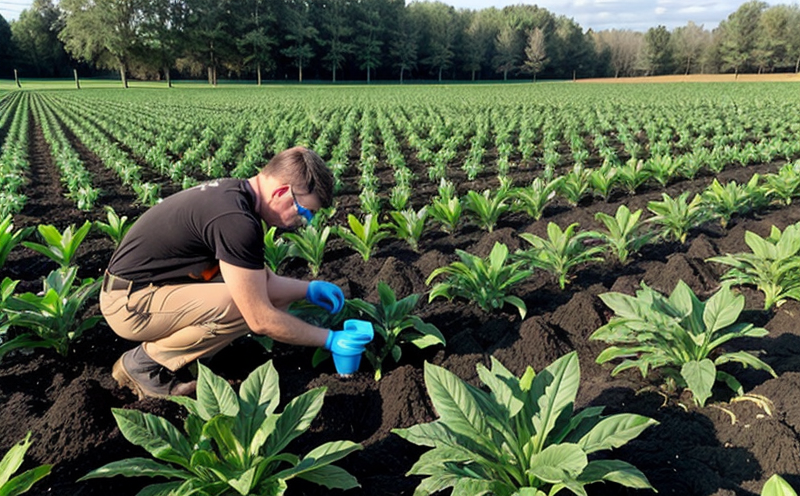Calcium Oxide (CaO) Testing in Fertilizers
The testing of calcium oxide (CaO) content in fertilizers is crucial for ensuring product quality and compliance with regulatory standards. Calcium oxide, often found as hydrated lime or quicklime, is a component that can significantly influence the performance of certain types of fertilizers, particularly those designed to enhance soil pH levels. This service ensures that the specified CaO content in your fertilizer meets both internal specifications and external requirements.
The process involves precise chemical analysis using methods that accurately quantify the CaO content within the fertilizer sample. The accuracy of this testing is critical as even small variations can impact the effectiveness of the fertilizer application, affecting plant growth and soil health. In compliance with standards such as ISO 14870, ASTM D3162, and EN 15992, our team ensures that each test adheres to recognized international benchmarks.
Our testing service is designed for a wide range of fertilizers including granular, liquid, and specialty blends. The process begins with meticulous sample preparation, ensuring the integrity of the material being analyzed. Once prepared, the samples undergo rigorous analysis using advanced instrumentation such as atomic absorption spectrophotometry (AAS) which provides high precision and accuracy in measuring CaO content.
The importance of this testing cannot be overstated. It helps in optimizing fertilizer formulations to meet specific crop requirements, thereby improving agricultural yields without over-fertilization. For compliance officers and quality managers, it ensures that the products they produce or procure adhere to set standards, thus protecting both business reputation and end-user satisfaction.
In R&D contexts, accurate CaO content testing is pivotal for developing new formulations that can better meet evolving environmental and agricultural needs. For procurement teams, this service guarantees reliability in supplier selection by validating the consistency of CaO content across batches.
The precision of our testing methods ensures that you are provided with reliable data to make informed decisions about your fertilizer products. The results are presented in a clear, concise manner, allowing stakeholders to understand the implications for their operations and applications.
Our comprehensive approach not only meets but exceeds industry expectations by providing detailed reports that include recommended adjustments based on test findings. This proactive stance helps prevent issues before they arise, ensuring that you maintain high standards of product quality and regulatory compliance.
Applied Standards
| Standard | Description |
|---|---|
| ISO 14870:2013 | Method for the Determination of Calcium Oxide in Fertilizers by Atomic Absorption Spectrophotometry (AAS) |
| ASTM D3162-05(2019) | Standard Test Method for Calcium Oxide in Hydrated Lime and Limestone by Direct Combustion |
| EN 15992:2014 | Calcium oxide content of fertilizers - Determination using atomic absorption spectrophotometry (AAS) |
| AAPLD Fertilizer Standards | General guidelines for fertilizer quality and testing methods |
The standards listed above are essential in ensuring that the CaO content in fertilizers is accurately measured. These tests align with global best practices, providing consistent results across different geographical regions.
Industry Applications
In agriculture and forestry, accurate CaO testing ensures optimal soil pH levels necessary for robust plant growth. The correct amount of calcium oxide in fertilizers can enhance nutrient availability to crops while maintaining soil health. This is particularly important in precision farming where every detail counts towards achieving higher yields.
For specialty fertilizers aimed at correcting alkaline soils, CaO testing ensures that the product performs as expected without causing imbalances detrimental to plant life. Compliance with regulatory standards through accurate testing also builds trust among consumers and regulators alike.
In research and development, this service allows for continuous improvement in fertilizer formulations by providing reliable data on CaO content variations across different batches or geographical sources of raw materials.
Environmental and Sustainability Contributions
Testing calcium oxide (CaO) content in fertilizers plays a pivotal role in promoting sustainable agricultural practices. By ensuring correct levels of CaO, this service helps minimize the risk of environmental degradation often associated with over-fertilization.
The accurate application of calcium oxide can help neutralize acidic soils without causing excessive alkalinity that could harm beneficial soil microorganisms and lead to reduced biodiversity. This balance supports long-term soil health and sustainability practices.
For manufacturers, adhering to stringent CaO content testing ensures they meet both regulatory requirements and customer expectations regarding product quality. This contributes positively towards the overall environmental footprint of agricultural operations by reducing unnecessary inputs and promoting efficient resource use.





